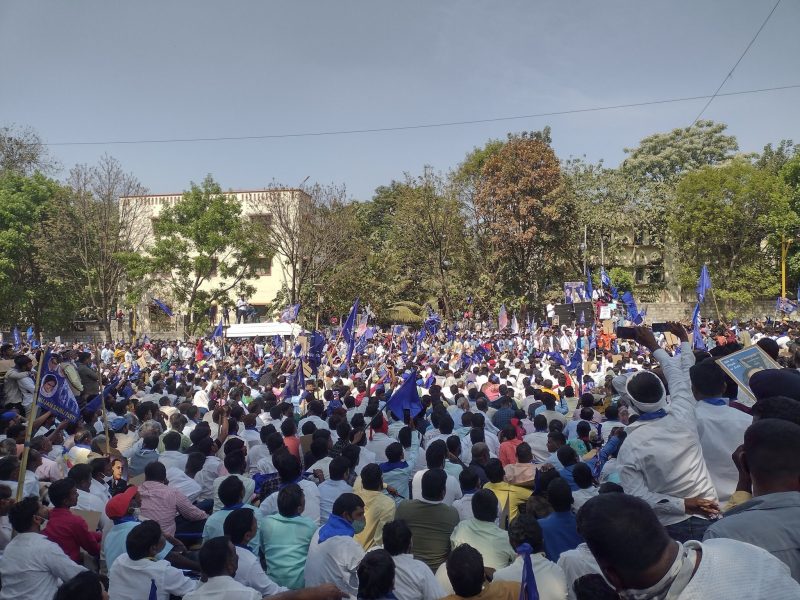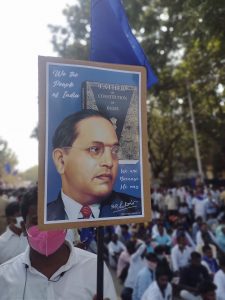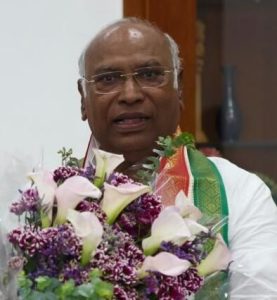
Karnataka: Not big on loyalties, Dalit voters keep parties guessing

The three key parties in Karnataka have tried to carve up major communities into their political fiefdoms. The BJP targets the Lingayats, the JD(S) appeals to the Vokkaligas, and the Congress relies on the Kurubas and Muslims.
But Dalits are a striking exception. They seem to move fluidly between parties, embracing and dumping them at will, during elections. A quick look at the Dalit voting in the recent elections brings home the point.
Shifting Dalit votes
In the last four elections, the results in the 36 seats reserved for Dalits in Karnataka have fluctuated like the stock exchange. The BJP won 13 seats in 2004, which almost doubled to 22 in 2008. It then fell dramatically to six seats in 2013 and climbed back to 16 in 2018.
The BJP’s fluctuating fortunes have so far translated into corresponding gains or losses for the Congress, which won seven, eight, 17, and 13 seats in the same elections. The seats won by JD(S), other parties, and Independents have also varied over these elections.
Also read: 2023 Karnataka polls: BJP goes all out to woo Vokkaligas and OBCs
The agile Dalit vote flies against the conventional wisdom that the so-called Left and Right-Hand groups, which together comprise over 65% of the depressed community, vote loyally for the BJP and the Congress respectively.
The election outcome in the reserved constituencies depends on how other castes vote as well. But given the concentration of Dalit voters in them, the results serve as reliable indicators of the community mood.
Many read the moving Dalit vote as a sign of political maturity in a community, over 70% of which lives in villages owning less than 2% of land, and has suffered unparalleled discrimination for centuries.
A lecturer from Hassan, who teaches at a government college, said: “Dalits vote with a critical mind of their own. They will vote for any party that can further their interests. There is no question of any party owning Dalit votes.”
Scramble for Dalit votes
Wooing Dalits, who comprise over 17.5% of the total population, is a priority for all parties, as their votes can make the difference between a win or a defeat.
With the coming state elections in mind, the BJP, which is battling severe anti-incumbency, increased reservation from 15% to 17% for Scheduled Castes and from 3% to 7% for Scheduled Tribes. When clubbed with the existing reservation for other communities, the hike overshoots the 50% limit set by the Supreme Court.
Also read: Karnataka: BJP fights for Cong’s Dalit pie with ‘internal reservation’ move
The move seems to have paid off with the Scheduled Tribe voters, who have been moving closer to BJP over the past 10 years. Now, they have another compelling reason to further consolidate behind the party.
But the Dalits, a diverse group of 101 castes, do not seem to be enthused by the hike in the reservation. They have other pressing concerns, which came to the fore in two recent mega events in Bengaluru, one marking their cultural assertion and another seeking internal reservation for the weaker actions of the community.
Dalit cultural assertion
On December 6, several prominent Dalit organisations came together at a Cultural Resistance Convention in Bengaluru. The event was attended by over a lakh people from all over the state.
The convention sought to forge unity among the notoriously splintered Dalit groups. Ten well-known Dalit leaders, who had been charting their own course for decades, shared the platform and agreed on a common agenda.
They also sought to aggressively take on the Sangh Parivar politics. Calling out the RSS and the BJP, speaker after speaker cautioned Dalits against the dramatic rise of Hindutva forces, who were imposing a “homogenous Vedic culture” on the rest of society.
To an attentive crowd, they explained how the BJP government was subverting the constitution, diluting reservation, weakening institutions, privatising the public sector, rolling back welfare measures, and promoting hatred towards minorities.
Also read: Kharge’s rise in Congress leaves rivals anxious, from Karnataka to UP
Of the 15 resolutions passed at the Convention, as many as six explicitly dealt with Sangh Parivar politics, and one of them opposed Hindutva onslaught on the minorities.
Several book stalls did brisk business selling pro-Dalit literature, and in an epiphanic moment, a ₹600 book on Tipu Sultan written by historian Nanjaraha Urs sold out in hours.
“The country is passing through a gut-wrenching phase. There is an all-out attempt to stamp out Dalit identity by promoting delusions of caste and religion. We realise that Ambedkar is the antidote to the Hindutva cultural aggression,” said Indudara Honnapura, one of the main organisers of the convention.

“Dalits are upset about several issues. The hike in reservation is irrelevant, as the very concept of reservation is melting before our eyes due to privatisation, shrinking of government jobs, and 10% reservation for the Economically Weaker Section (EWS),” he added.
Dalits vs Sangh Parivar
Dalits in Karnataka have been vigorously mobilising since the 1970s. Though political success has eluded them, they have emerged as a highly self-aware community led by towering writers and intellectuals.
Rooted in the secular and socialist ethos of the Indian constitution, many Dalit activists have kept a wary watch on the recent assertion of the Sangh Parivar in the state.
“An urge is building up among Dalits to align more and more with the spirit of Baba Saheb Ambedkar,” said Prof. Somashekar of the University of Mysore. Declining to go into the details, he said the current space available for Dalits in education, bureaucracy, economy, culture, and society at large has made them more perceptive.
Also read: What a tall Kempegowda statue may do for ‘edgy’ BJP in Karnataka
In recent months, Dalit organisations have hit the streets not just to protest the frequent atrocities against the community, but also to challenge the Sangh Parivar.
In October, RSS held a nine-day training camp in government-aided residential schools in three districts of Karnataka, Bidar, Uttara Kannada, and Kolar. In all these far-flung places, several Dalit organisations led protests, alleging that the camps were seeking to divide the society on communal lines.
In Bidar, over 500 protesters marched against the RSS for allegedly indoctrinating the youth with hate and fuelling animosity towards non-Hindus.
Dalit activists acknowledge that Hindutva politics has made inroads into their community and roped in many Dalit leaders and sections of the youth. But they see it as a passing phenomenon, which has already peaked, thanks to the rising awareness in the community.
Internal reservation
Internal reservation has probably emerged as the single most decisive factor in shaping large sections of Dalit votes in the coming elections.
Dalits castes are conventionally classified into four groups — Left Hand (LH), Right Hand (RH), Touchable, and others. Comprising 33.47% of Dalit population, LH castes are the most numerous. They are closely followed by the RH castes who represent 32% of Dalits.
LH castes are also the most impoverished and discriminated Dalit group. The sewage line workers, municipality sweepers, cobblers, tanners, and others engaged in similar professions come from their ranks.
Over the decades, they have been elbowed out of the reservation benefits by other Dalit groups, who are relatively better off.
In government jobs, the representation of the LH group is the poorest. The RH group fares relatively better, while the Touchable group, led by castes such as Bhovis and Lambanis, who constitute over 23% of the Dalit population, reportedly corner most jobs.
The group is also poorly represented in politics, as parties say it is hard to find LH candidates with a good spending power. Even in LH-dominant constituencies, it is common to see party tickets going to other Dalit candidates. In 2018, the Congress gave eight tickets to LH, 17 to RH, and the rest to other groups.
Also read: BJP faces Vokkaliga hurdle in Karnataka even as Cong, JD(S) enjoy edge
The BJP mobilised LH castes’ anger and weaned them away from Congress though, of late, complaints are surfacing that even BJP is pampering the stronger Dalit groups.
LH groups have been agitating for internal reservation for the last three decades without success. But their pressure led to the formation of a commission under Justice Sadashiva in 2005, which took seven years to submit its report.
Justice Sadashiva held a press conference after submitting the report and announced that he had recommended splitting of the Dalit quota between different communities: 6% for LH, 5% for RH, 3% for Touchables, and 1% for the others.
Three governments headed by the Congress, JDS, and BJP have since then failed to even make the report public, let alone act on them. The RH and touchable castes have blocked any move on the internal reservation so far, and Siddaramaiah faced revolt from his Dalit ministers and MLAs when he tried to press forward on the issue.
But in recent years, RH castes have reportedly toned down their opposition to the Sadashiva Commission report. Dalit leaders say RH castes realise the injustice done to the LH castes and are anxious to address it to promote larger Dalit unity.
Honnapura said, “The report has never been released, so all kinds of speculation fly around it. Much of the RH opposition came from the misconception that it was against them. There is a better understanding now and they realise that it will not hurt them.”
“As a member of the RH community, I am for implementing the Sadashiva Commission report,” said the Hassan lecturer.
Ball in BJP’s court
After the BJP announced the reservation hike, LH groups intensified their agitation for a separate quota. They launched a massive protest in Bengaluru on December 11 and chased away a minister, who came to talk, insisting that the Chief Minister himself come in person.
The peaceful protest took an unexpected turn when the police caned protesters, who were allegedly blocking a road, and arrested many of them. The incident triggered an emotional outburst among the LH members, who vowed to teach BJP a lesson.
Also read: Bharat Jodo Yatra: Rahul completes Karnataka leg with a finger on every pulse
In 2013, the BJP government under Sadananda Gowda ordered a lathi-charge against LH groups, who were protesting near the Assembly session in Belagavi. The LH outrage that followed was instrumental in bringing down the BJP tally in the reserved seats from 22 to six in the election that followed.
When the BJP government hiked the reservation in October, it did not seem to have a plan to tackle the demand for internal reservation.
It announced a Cabinet subcommittee under Law Minister Madhuswamy to look into the issue on October 8. But the committee came into effect only on December 13 in response to the intensifying LH agitation in Bengaluru.
A political hot potato
Internal reservation is a politically tough decision for the BJP, as there is no clarity on how widespread is the support within the RH community for splitting the quota. The move would definitely alienate Touchable castes, who have already come together to launch a counter agitation against internal reservation.
Political analyst Shivarudraiah Swamy said, “Only a few Bhovi politicians, like Goolihatti Shekar and Shivaraj Thangadagi, have money and can even win as independent candidates. They have created a fallacy that all Bhovis are rich.”
Internal reservation takes considerable political will, as the state government would have to persuade the Centre to amend the constitution. The issue is tricky, as two different three-bench judges of the Supreme Court have given opposing verdicts, requiring a bigger bench to settle the matter.
Not Congress gain
The BJP’s headache may not provide any relief for the Congress, as Dalits have long-standing grievances with the party.
Dalits blame it for benefitting from their votes but without ever taking substantive measures to empower them. They note that over the decades, the Congress has prevented Dalit leaders, such as Basavalingappa, Rachiah, Parameshwara, and Mallikarjun Kharge from taking the chief minister’s post.
Also read: Rising demand for ‘religion’ tag for Veerashaiva-Lingayats has BJP worried
LH groups are still upset with Siddaramaiah for promising and not delivering on the internal reservation. Their anger knocked down the Congress tally in Dalit seats from 17 to 13 in the 2018 election.

Mallikarjun Kharge’s election as Congress president seems to have done little to lift Dalit spirits across the state. Many see Congress benefitting only in parts of North Karnataka where he hails from and not elsewhere.
Future of Dalit politics
Many think the BJP and other parties want to keep the internal reservation issue alive, as it keeps the different Dalit groups at loggerheads, making it easier for them to pick votes.
The Hassan lecturer said deep inside their heart, no party wants to resolve the issue. “They prefer to divide and rule Dalits,” said Honnapura.
While the LH castes are totally focused on internal reservation, the RH groups have a broader cultural and political agenda. Resolving the issue would unite both the factions and may prompt them to leverage their numbers to become politically more assertive.
Watch: With elections closing in, can BJP woo back Lingayats in Karnataka?
The Dalits, who are disillusioned with the mainstream parties, may become more receptive to parties with distinct social agenda like the BSP and even the SDPI, which has a noted Dalit activist as its general secretary.
SDPI and Dalit organisations have begun to coordinate agitations against Sangh Parivar in many places. SDPI members took part in the Dalit protests against the RSS training camps in government schools. On December 12, SDPI members marched in Chitradurga, demanding internal reservation for LH castes.
“The overreach of the Sangh Parivar has made Dalits think for themselves. They feel they must unite and join hands with other subaltern groups, all of whom have been let down by the mainstream parties,” said the Hassan lecturer.


